Commercial and Corporations Law: Consumer Guarantees and Remedies
VerifiedAdded on 2021/05/27
|10
|2398
|104
Case Study
AI Summary
This case study examines a scenario involving Sangeeta's purchases from Myers, a departmental store, and analyzes the application of the Australian Consumer Law (ACL). The assignment addresses key issues, including whether Sangeeta qualifies as a consumer under the ACL and whether Myers breached consumer guarantees. It delves into specific breaches, such as goods not matching descriptions, unacceptable quality of goods, and goods not being fit for their intended purpose. The analysis references relevant sections of the ACL, including sections on acceptable quality, fitness for purpose, and goods sold by description. The case study also explores the remedies available to Sangeeta, such as rejection of goods, as per the ACL provisions. Finally, the assignment discusses the effectiveness of exclusion clauses in limiting Myers' liability. The analysis provides a comprehensive understanding of consumer rights and the legal consequences of failing to meet consumer guarantees in a commercial context.
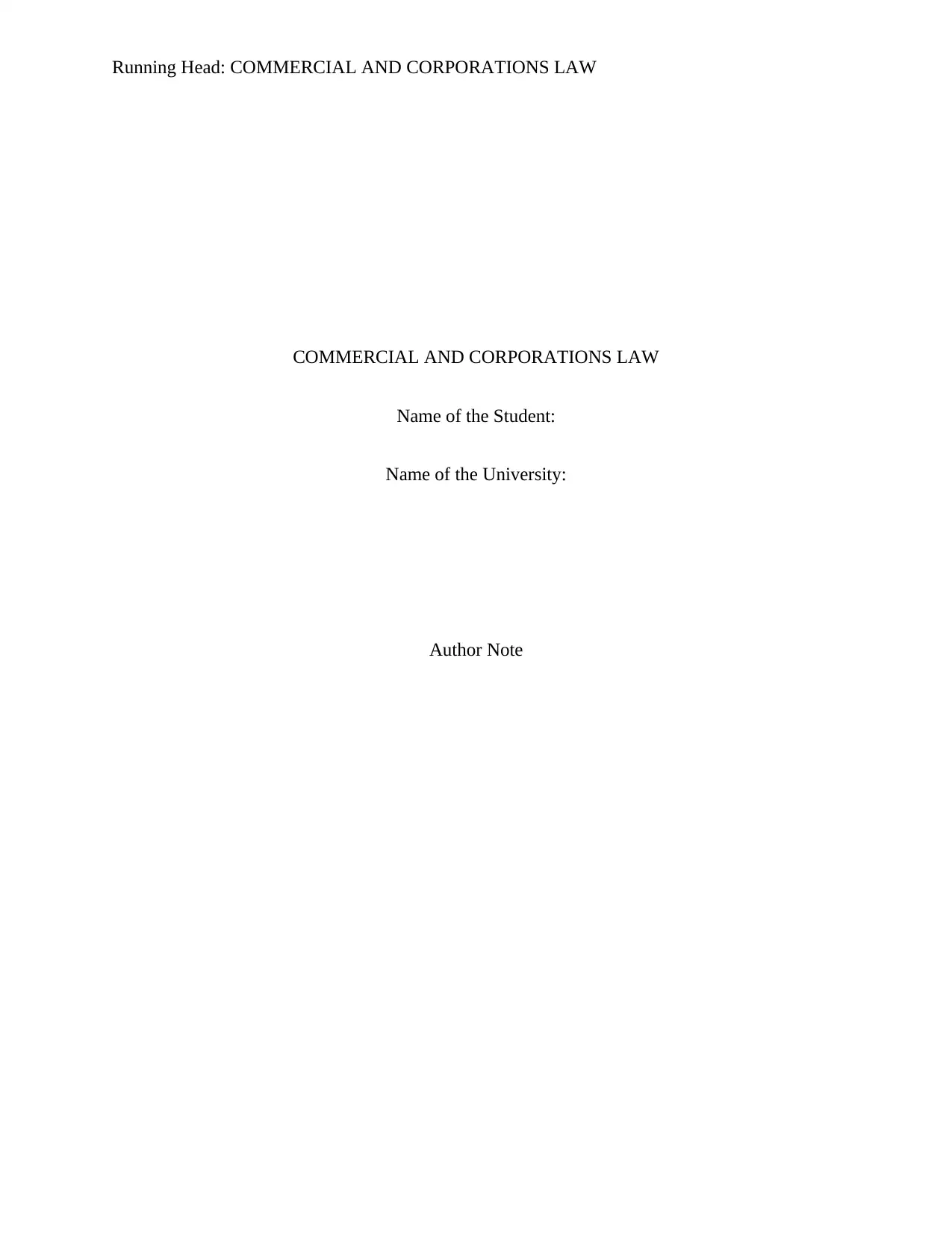
Running Head: COMMERCIAL AND CORPORATIONS LAW
COMMERCIAL AND CORPORATIONS LAW
Name of the Student:
Name of the University:
Author Note
COMMERCIAL AND CORPORATIONS LAW
Name of the Student:
Name of the University:
Author Note
Paraphrase This Document
Need a fresh take? Get an instant paraphrase of this document with our AI Paraphraser
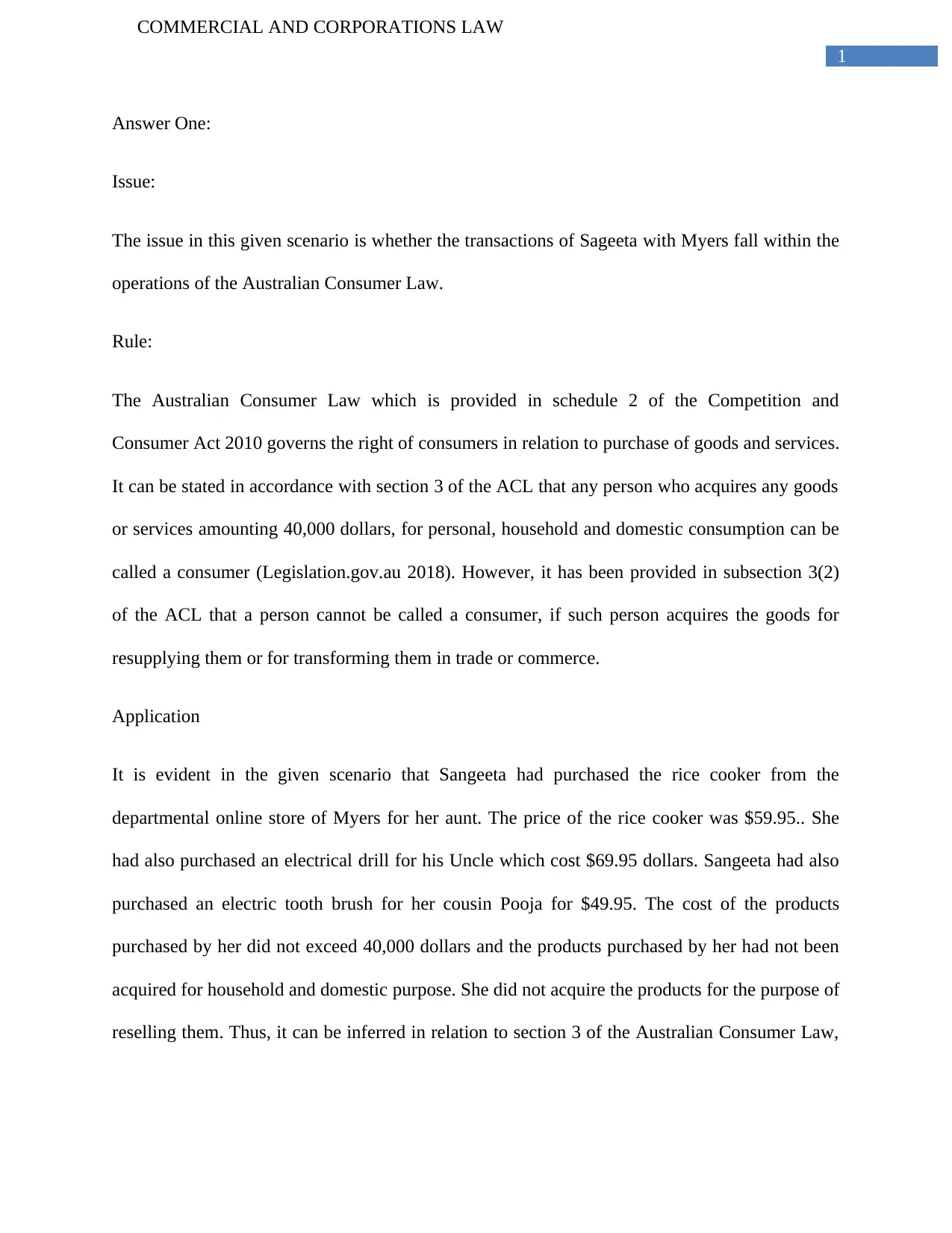
1
COMMERCIAL AND CORPORATIONS LAW
Answer One:
Issue:
The issue in this given scenario is whether the transactions of Sageeta with Myers fall within the
operations of the Australian Consumer Law.
Rule:
The Australian Consumer Law which is provided in schedule 2 of the Competition and
Consumer Act 2010 governs the right of consumers in relation to purchase of goods and services.
It can be stated in accordance with section 3 of the ACL that any person who acquires any goods
or services amounting 40,000 dollars, for personal, household and domestic consumption can be
called a consumer (Legislation.gov.au 2018). However, it has been provided in subsection 3(2)
of the ACL that a person cannot be called a consumer, if such person acquires the goods for
resupplying them or for transforming them in trade or commerce.
Application
It is evident in the given scenario that Sangeeta had purchased the rice cooker from the
departmental online store of Myers for her aunt. The price of the rice cooker was $59.95.. She
had also purchased an electrical drill for his Uncle which cost $69.95 dollars. Sangeeta had also
purchased an electric tooth brush for her cousin Pooja for $49.95. The cost of the products
purchased by her did not exceed 40,000 dollars and the products purchased by her had not been
acquired for household and domestic purpose. She did not acquire the products for the purpose of
reselling them. Thus, it can be inferred in relation to section 3 of the Australian Consumer Law,
COMMERCIAL AND CORPORATIONS LAW
Answer One:
Issue:
The issue in this given scenario is whether the transactions of Sageeta with Myers fall within the
operations of the Australian Consumer Law.
Rule:
The Australian Consumer Law which is provided in schedule 2 of the Competition and
Consumer Act 2010 governs the right of consumers in relation to purchase of goods and services.
It can be stated in accordance with section 3 of the ACL that any person who acquires any goods
or services amounting 40,000 dollars, for personal, household and domestic consumption can be
called a consumer (Legislation.gov.au 2018). However, it has been provided in subsection 3(2)
of the ACL that a person cannot be called a consumer, if such person acquires the goods for
resupplying them or for transforming them in trade or commerce.
Application
It is evident in the given scenario that Sangeeta had purchased the rice cooker from the
departmental online store of Myers for her aunt. The price of the rice cooker was $59.95.. She
had also purchased an electrical drill for his Uncle which cost $69.95 dollars. Sangeeta had also
purchased an electric tooth brush for her cousin Pooja for $49.95. The cost of the products
purchased by her did not exceed 40,000 dollars and the products purchased by her had not been
acquired for household and domestic purpose. She did not acquire the products for the purpose of
reselling them. Thus, it can be inferred in relation to section 3 of the Australian Consumer Law,
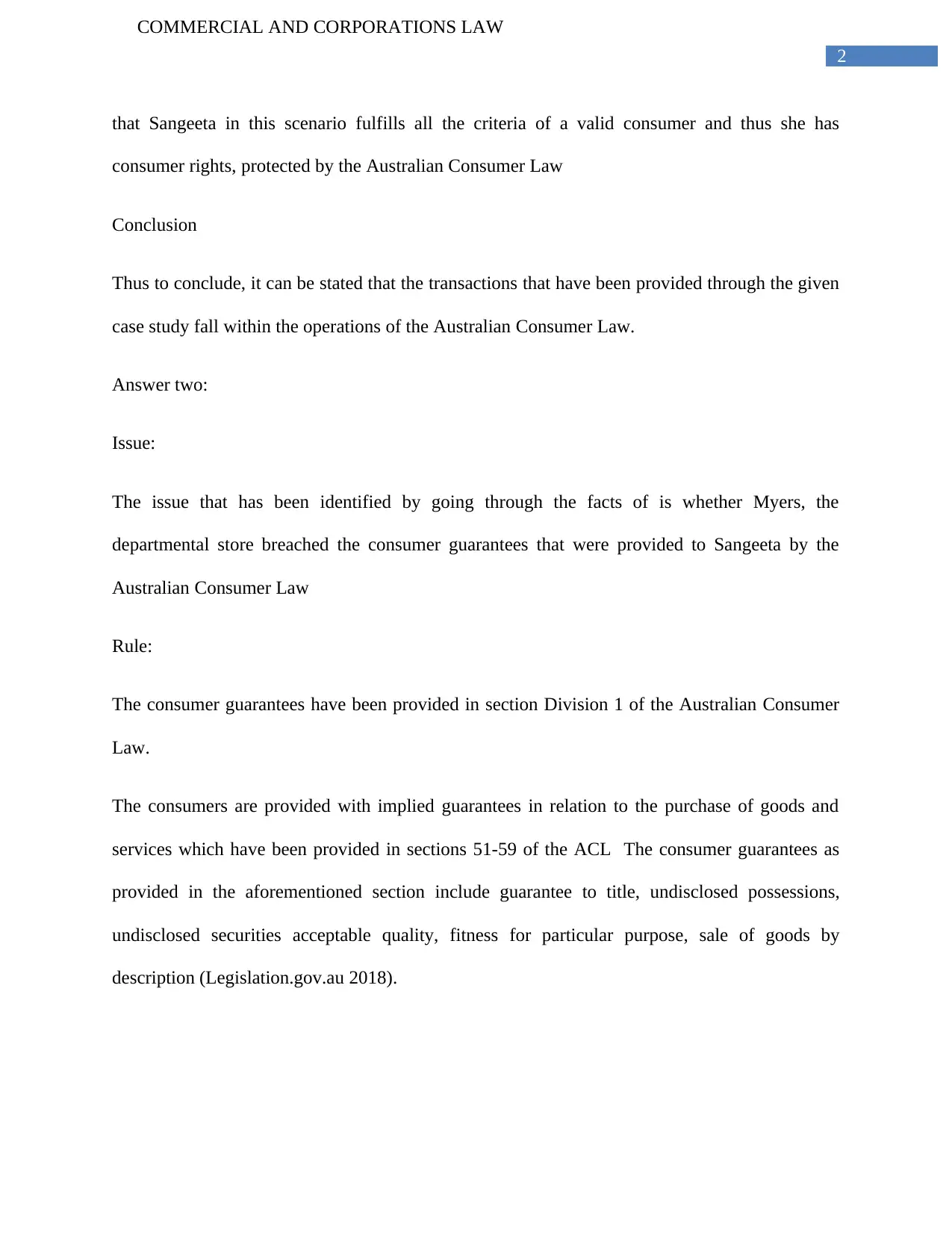
2
COMMERCIAL AND CORPORATIONS LAW
that Sangeeta in this scenario fulfills all the criteria of a valid consumer and thus she has
consumer rights, protected by the Australian Consumer Law
Conclusion
Thus to conclude, it can be stated that the transactions that have been provided through the given
case study fall within the operations of the Australian Consumer Law.
Answer two:
Issue:
The issue that has been identified by going through the facts of is whether Myers, the
departmental store breached the consumer guarantees that were provided to Sangeeta by the
Australian Consumer Law
Rule:
The consumer guarantees have been provided in section Division 1 of the Australian Consumer
Law.
The consumers are provided with implied guarantees in relation to the purchase of goods and
services which have been provided in sections 51-59 of the ACL The consumer guarantees as
provided in the aforementioned section include guarantee to title, undisclosed possessions,
undisclosed securities acceptable quality, fitness for particular purpose, sale of goods by
description (Legislation.gov.au 2018).
COMMERCIAL AND CORPORATIONS LAW
that Sangeeta in this scenario fulfills all the criteria of a valid consumer and thus she has
consumer rights, protected by the Australian Consumer Law
Conclusion
Thus to conclude, it can be stated that the transactions that have been provided through the given
case study fall within the operations of the Australian Consumer Law.
Answer two:
Issue:
The issue that has been identified by going through the facts of is whether Myers, the
departmental store breached the consumer guarantees that were provided to Sangeeta by the
Australian Consumer Law
Rule:
The consumer guarantees have been provided in section Division 1 of the Australian Consumer
Law.
The consumers are provided with implied guarantees in relation to the purchase of goods and
services which have been provided in sections 51-59 of the ACL The consumer guarantees as
provided in the aforementioned section include guarantee to title, undisclosed possessions,
undisclosed securities acceptable quality, fitness for particular purpose, sale of goods by
description (Legislation.gov.au 2018).
⊘ This is a preview!⊘
Do you want full access?
Subscribe today to unlock all pages.

Trusted by 1+ million students worldwide
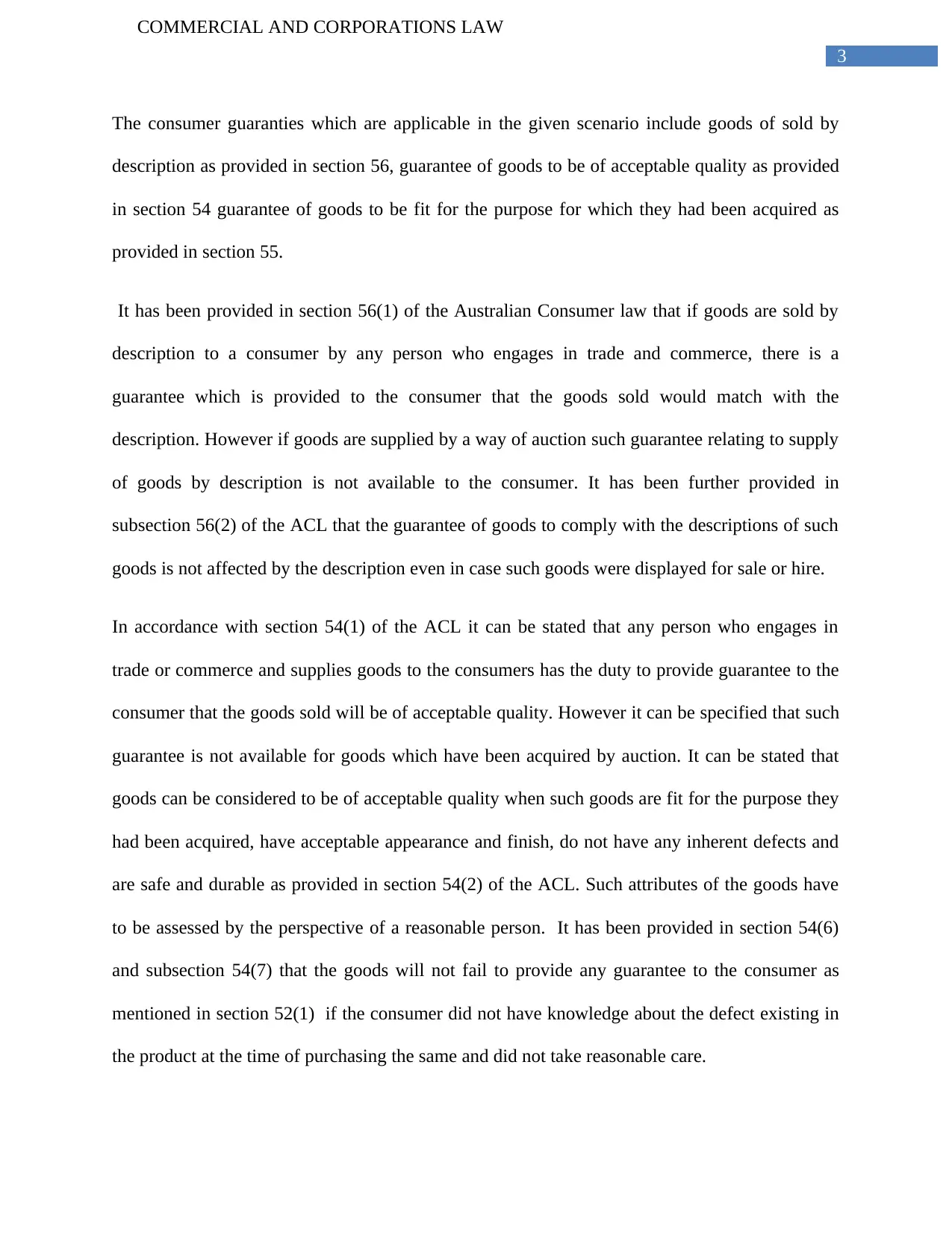
3
COMMERCIAL AND CORPORATIONS LAW
The consumer guaranties which are applicable in the given scenario include goods of sold by
description as provided in section 56, guarantee of goods to be of acceptable quality as provided
in section 54 guarantee of goods to be fit for the purpose for which they had been acquired as
provided in section 55.
It has been provided in section 56(1) of the Australian Consumer law that if goods are sold by
description to a consumer by any person who engages in trade and commerce, there is a
guarantee which is provided to the consumer that the goods sold would match with the
description. However if goods are supplied by a way of auction such guarantee relating to supply
of goods by description is not available to the consumer. It has been further provided in
subsection 56(2) of the ACL that the guarantee of goods to comply with the descriptions of such
goods is not affected by the description even in case such goods were displayed for sale or hire.
In accordance with section 54(1) of the ACL it can be stated that any person who engages in
trade or commerce and supplies goods to the consumers has the duty to provide guarantee to the
consumer that the goods sold will be of acceptable quality. However it can be specified that such
guarantee is not available for goods which have been acquired by auction. It can be stated that
goods can be considered to be of acceptable quality when such goods are fit for the purpose they
had been acquired, have acceptable appearance and finish, do not have any inherent defects and
are safe and durable as provided in section 54(2) of the ACL. Such attributes of the goods have
to be assessed by the perspective of a reasonable person. It has been provided in section 54(6)
and subsection 54(7) that the goods will not fail to provide any guarantee to the consumer as
mentioned in section 52(1) if the consumer did not have knowledge about the defect existing in
the product at the time of purchasing the same and did not take reasonable care.
COMMERCIAL AND CORPORATIONS LAW
The consumer guaranties which are applicable in the given scenario include goods of sold by
description as provided in section 56, guarantee of goods to be of acceptable quality as provided
in section 54 guarantee of goods to be fit for the purpose for which they had been acquired as
provided in section 55.
It has been provided in section 56(1) of the Australian Consumer law that if goods are sold by
description to a consumer by any person who engages in trade and commerce, there is a
guarantee which is provided to the consumer that the goods sold would match with the
description. However if goods are supplied by a way of auction such guarantee relating to supply
of goods by description is not available to the consumer. It has been further provided in
subsection 56(2) of the ACL that the guarantee of goods to comply with the descriptions of such
goods is not affected by the description even in case such goods were displayed for sale or hire.
In accordance with section 54(1) of the ACL it can be stated that any person who engages in
trade or commerce and supplies goods to the consumers has the duty to provide guarantee to the
consumer that the goods sold will be of acceptable quality. However it can be specified that such
guarantee is not available for goods which have been acquired by auction. It can be stated that
goods can be considered to be of acceptable quality when such goods are fit for the purpose they
had been acquired, have acceptable appearance and finish, do not have any inherent defects and
are safe and durable as provided in section 54(2) of the ACL. Such attributes of the goods have
to be assessed by the perspective of a reasonable person. It has been provided in section 54(6)
and subsection 54(7) that the goods will not fail to provide any guarantee to the consumer as
mentioned in section 52(1) if the consumer did not have knowledge about the defect existing in
the product at the time of purchasing the same and did not take reasonable care.
Paraphrase This Document
Need a fresh take? Get an instant paraphrase of this document with our AI Paraphraser
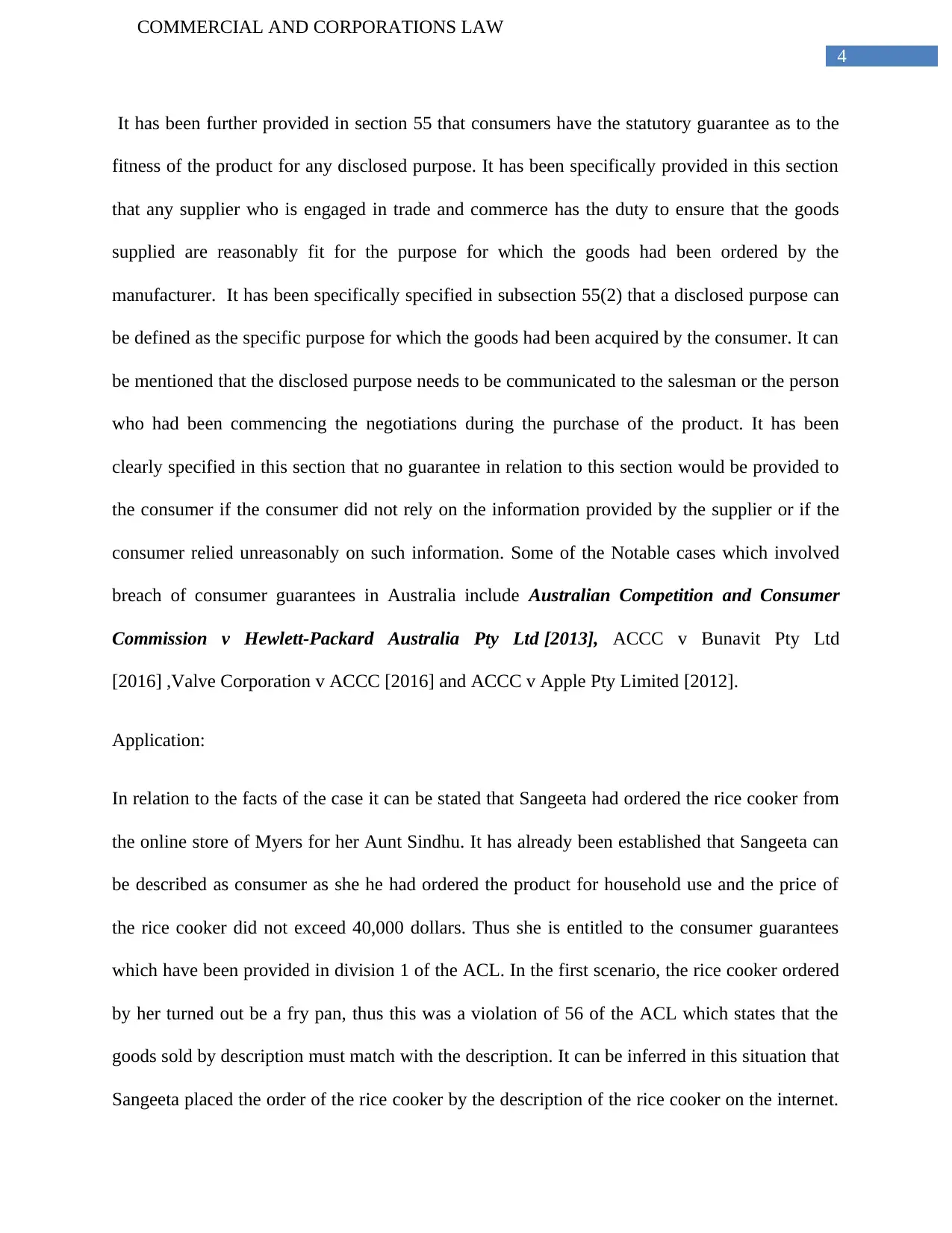
4
COMMERCIAL AND CORPORATIONS LAW
It has been further provided in section 55 that consumers have the statutory guarantee as to the
fitness of the product for any disclosed purpose. It has been specifically provided in this section
that any supplier who is engaged in trade and commerce has the duty to ensure that the goods
supplied are reasonably fit for the purpose for which the goods had been ordered by the
manufacturer. It has been specifically specified in subsection 55(2) that a disclosed purpose can
be defined as the specific purpose for which the goods had been acquired by the consumer. It can
be mentioned that the disclosed purpose needs to be communicated to the salesman or the person
who had been commencing the negotiations during the purchase of the product. It has been
clearly specified in this section that no guarantee in relation to this section would be provided to
the consumer if the consumer did not rely on the information provided by the supplier or if the
consumer relied unreasonably on such information. Some of the Notable cases which involved
breach of consumer guarantees in Australia include Australian Competition and Consumer
Commission v Hewlett-Packard Australia Pty Ltd [2013], ACCC v Bunavit Pty Ltd
[2016] ,Valve Corporation v ACCC [2016] and ACCC v Apple Pty Limited [2012].
Application:
In relation to the facts of the case it can be stated that Sangeeta had ordered the rice cooker from
the online store of Myers for her Aunt Sindhu. It has already been established that Sangeeta can
be described as consumer as she he had ordered the product for household use and the price of
the rice cooker did not exceed 40,000 dollars. Thus she is entitled to the consumer guarantees
which have been provided in division 1 of the ACL. In the first scenario, the rice cooker ordered
by her turned out be a fry pan, thus this was a violation of 56 of the ACL which states that the
goods sold by description must match with the description. It can be inferred in this situation that
Sangeeta placed the order of the rice cooker by the description of the rice cooker on the internet.
COMMERCIAL AND CORPORATIONS LAW
It has been further provided in section 55 that consumers have the statutory guarantee as to the
fitness of the product for any disclosed purpose. It has been specifically provided in this section
that any supplier who is engaged in trade and commerce has the duty to ensure that the goods
supplied are reasonably fit for the purpose for which the goods had been ordered by the
manufacturer. It has been specifically specified in subsection 55(2) that a disclosed purpose can
be defined as the specific purpose for which the goods had been acquired by the consumer. It can
be mentioned that the disclosed purpose needs to be communicated to the salesman or the person
who had been commencing the negotiations during the purchase of the product. It has been
clearly specified in this section that no guarantee in relation to this section would be provided to
the consumer if the consumer did not rely on the information provided by the supplier or if the
consumer relied unreasonably on such information. Some of the Notable cases which involved
breach of consumer guarantees in Australia include Australian Competition and Consumer
Commission v Hewlett-Packard Australia Pty Ltd [2013], ACCC v Bunavit Pty Ltd
[2016] ,Valve Corporation v ACCC [2016] and ACCC v Apple Pty Limited [2012].
Application:
In relation to the facts of the case it can be stated that Sangeeta had ordered the rice cooker from
the online store of Myers for her Aunt Sindhu. It has already been established that Sangeeta can
be described as consumer as she he had ordered the product for household use and the price of
the rice cooker did not exceed 40,000 dollars. Thus she is entitled to the consumer guarantees
which have been provided in division 1 of the ACL. In the first scenario, the rice cooker ordered
by her turned out be a fry pan, thus this was a violation of 56 of the ACL which states that the
goods sold by description must match with the description. It can be inferred in this situation that
Sangeeta placed the order of the rice cooker by the description of the rice cooker on the internet.
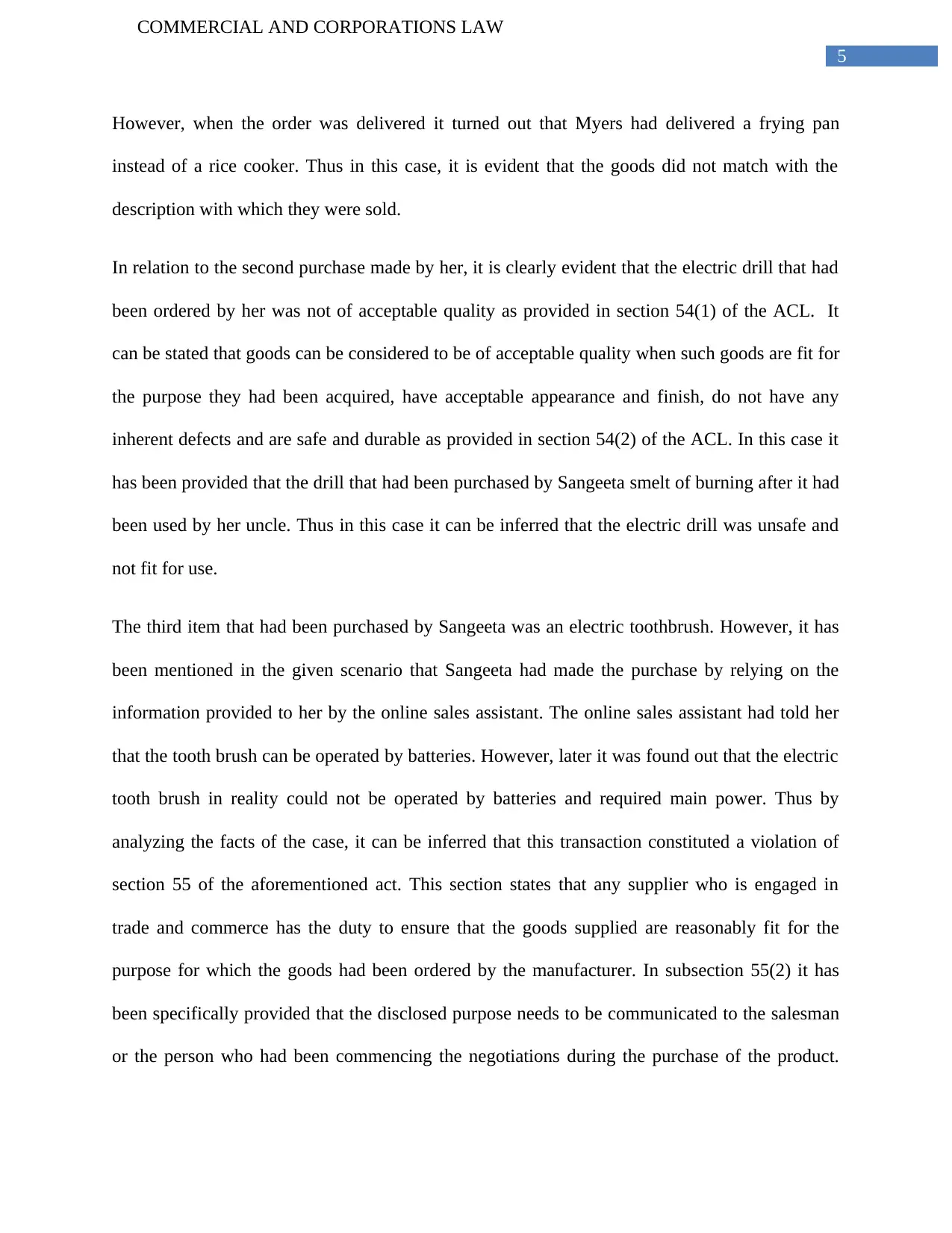
5
COMMERCIAL AND CORPORATIONS LAW
However, when the order was delivered it turned out that Myers had delivered a frying pan
instead of a rice cooker. Thus in this case, it is evident that the goods did not match with the
description with which they were sold.
In relation to the second purchase made by her, it is clearly evident that the electric drill that had
been ordered by her was not of acceptable quality as provided in section 54(1) of the ACL. It
can be stated that goods can be considered to be of acceptable quality when such goods are fit for
the purpose they had been acquired, have acceptable appearance and finish, do not have any
inherent defects and are safe and durable as provided in section 54(2) of the ACL. In this case it
has been provided that the drill that had been purchased by Sangeeta smelt of burning after it had
been used by her uncle. Thus in this case it can be inferred that the electric drill was unsafe and
not fit for use.
The third item that had been purchased by Sangeeta was an electric toothbrush. However, it has
been mentioned in the given scenario that Sangeeta had made the purchase by relying on the
information provided to her by the online sales assistant. The online sales assistant had told her
that the tooth brush can be operated by batteries. However, later it was found out that the electric
tooth brush in reality could not be operated by batteries and required main power. Thus by
analyzing the facts of the case, it can be inferred that this transaction constituted a violation of
section 55 of the aforementioned act. This section states that any supplier who is engaged in
trade and commerce has the duty to ensure that the goods supplied are reasonably fit for the
purpose for which the goods had been ordered by the manufacturer. In subsection 55(2) it has
been specifically provided that the disclosed purpose needs to be communicated to the salesman
or the person who had been commencing the negotiations during the purchase of the product.
COMMERCIAL AND CORPORATIONS LAW
However, when the order was delivered it turned out that Myers had delivered a frying pan
instead of a rice cooker. Thus in this case, it is evident that the goods did not match with the
description with which they were sold.
In relation to the second purchase made by her, it is clearly evident that the electric drill that had
been ordered by her was not of acceptable quality as provided in section 54(1) of the ACL. It
can be stated that goods can be considered to be of acceptable quality when such goods are fit for
the purpose they had been acquired, have acceptable appearance and finish, do not have any
inherent defects and are safe and durable as provided in section 54(2) of the ACL. In this case it
has been provided that the drill that had been purchased by Sangeeta smelt of burning after it had
been used by her uncle. Thus in this case it can be inferred that the electric drill was unsafe and
not fit for use.
The third item that had been purchased by Sangeeta was an electric toothbrush. However, it has
been mentioned in the given scenario that Sangeeta had made the purchase by relying on the
information provided to her by the online sales assistant. The online sales assistant had told her
that the tooth brush can be operated by batteries. However, later it was found out that the electric
tooth brush in reality could not be operated by batteries and required main power. Thus by
analyzing the facts of the case, it can be inferred that this transaction constituted a violation of
section 55 of the aforementioned act. This section states that any supplier who is engaged in
trade and commerce has the duty to ensure that the goods supplied are reasonably fit for the
purpose for which the goods had been ordered by the manufacturer. In subsection 55(2) it has
been specifically provided that the disclosed purpose needs to be communicated to the salesman
or the person who had been commencing the negotiations during the purchase of the product.
⊘ This is a preview!⊘
Do you want full access?
Subscribe today to unlock all pages.

Trusted by 1+ million students worldwide
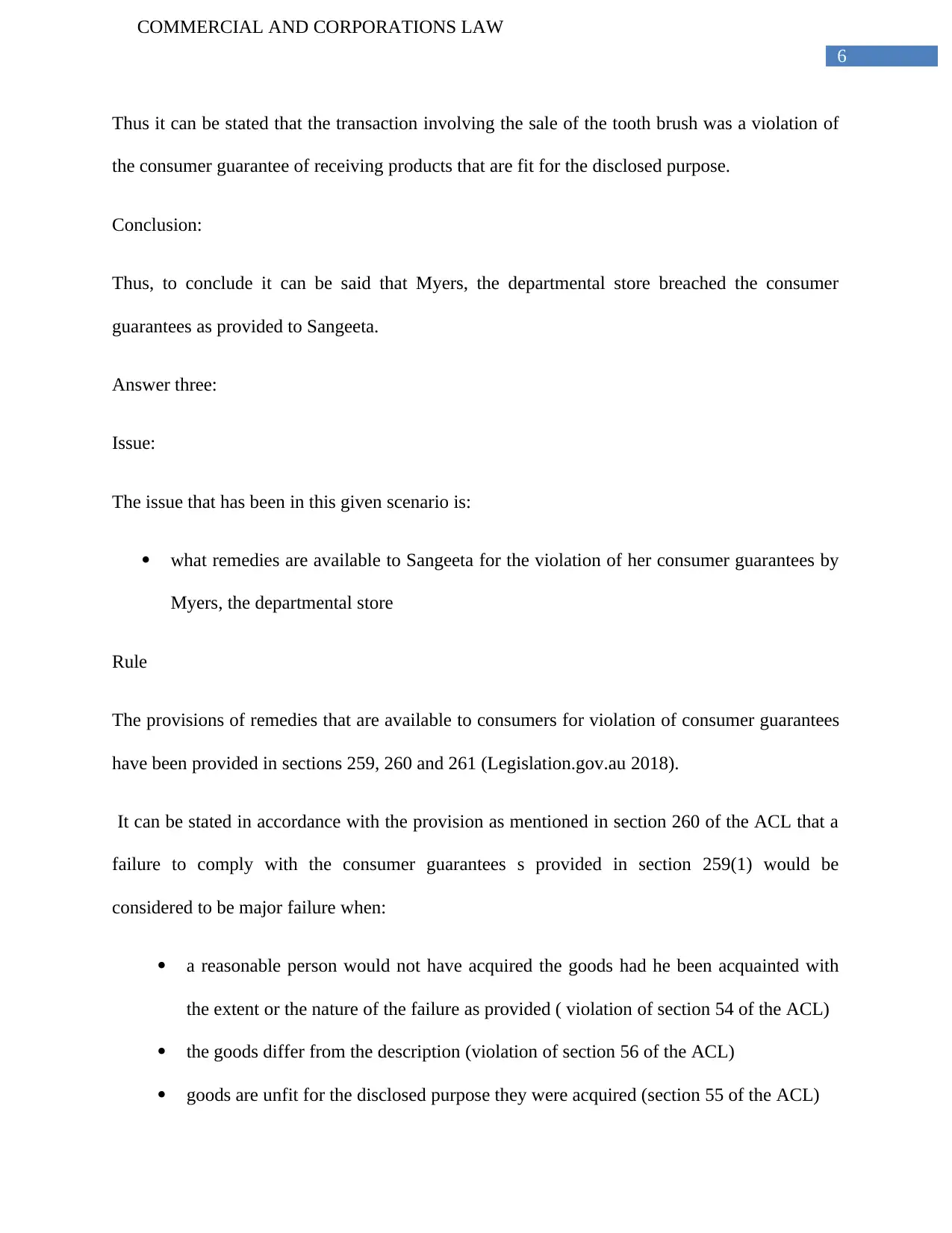
6
COMMERCIAL AND CORPORATIONS LAW
Thus it can be stated that the transaction involving the sale of the tooth brush was a violation of
the consumer guarantee of receiving products that are fit for the disclosed purpose.
Conclusion:
Thus, to conclude it can be said that Myers, the departmental store breached the consumer
guarantees as provided to Sangeeta.
Answer three:
Issue:
The issue that has been in this given scenario is:
what remedies are available to Sangeeta for the violation of her consumer guarantees by
Myers, the departmental store
Rule
The provisions of remedies that are available to consumers for violation of consumer guarantees
have been provided in sections 259, 260 and 261 (Legislation.gov.au 2018).
It can be stated in accordance with the provision as mentioned in section 260 of the ACL that a
failure to comply with the consumer guarantees s provided in section 259(1) would be
considered to be major failure when:
a reasonable person would not have acquired the goods had he been acquainted with
the extent or the nature of the failure as provided ( violation of section 54 of the ACL)
the goods differ from the description (violation of section 56 of the ACL)
goods are unfit for the disclosed purpose they were acquired (section 55 of the ACL)
COMMERCIAL AND CORPORATIONS LAW
Thus it can be stated that the transaction involving the sale of the tooth brush was a violation of
the consumer guarantee of receiving products that are fit for the disclosed purpose.
Conclusion:
Thus, to conclude it can be said that Myers, the departmental store breached the consumer
guarantees as provided to Sangeeta.
Answer three:
Issue:
The issue that has been in this given scenario is:
what remedies are available to Sangeeta for the violation of her consumer guarantees by
Myers, the departmental store
Rule
The provisions of remedies that are available to consumers for violation of consumer guarantees
have been provided in sections 259, 260 and 261 (Legislation.gov.au 2018).
It can be stated in accordance with the provision as mentioned in section 260 of the ACL that a
failure to comply with the consumer guarantees s provided in section 259(1) would be
considered to be major failure when:
a reasonable person would not have acquired the goods had he been acquainted with
the extent or the nature of the failure as provided ( violation of section 54 of the ACL)
the goods differ from the description (violation of section 56 of the ACL)
goods are unfit for the disclosed purpose they were acquired (section 55 of the ACL)
Paraphrase This Document
Need a fresh take? Get an instant paraphrase of this document with our AI Paraphraser
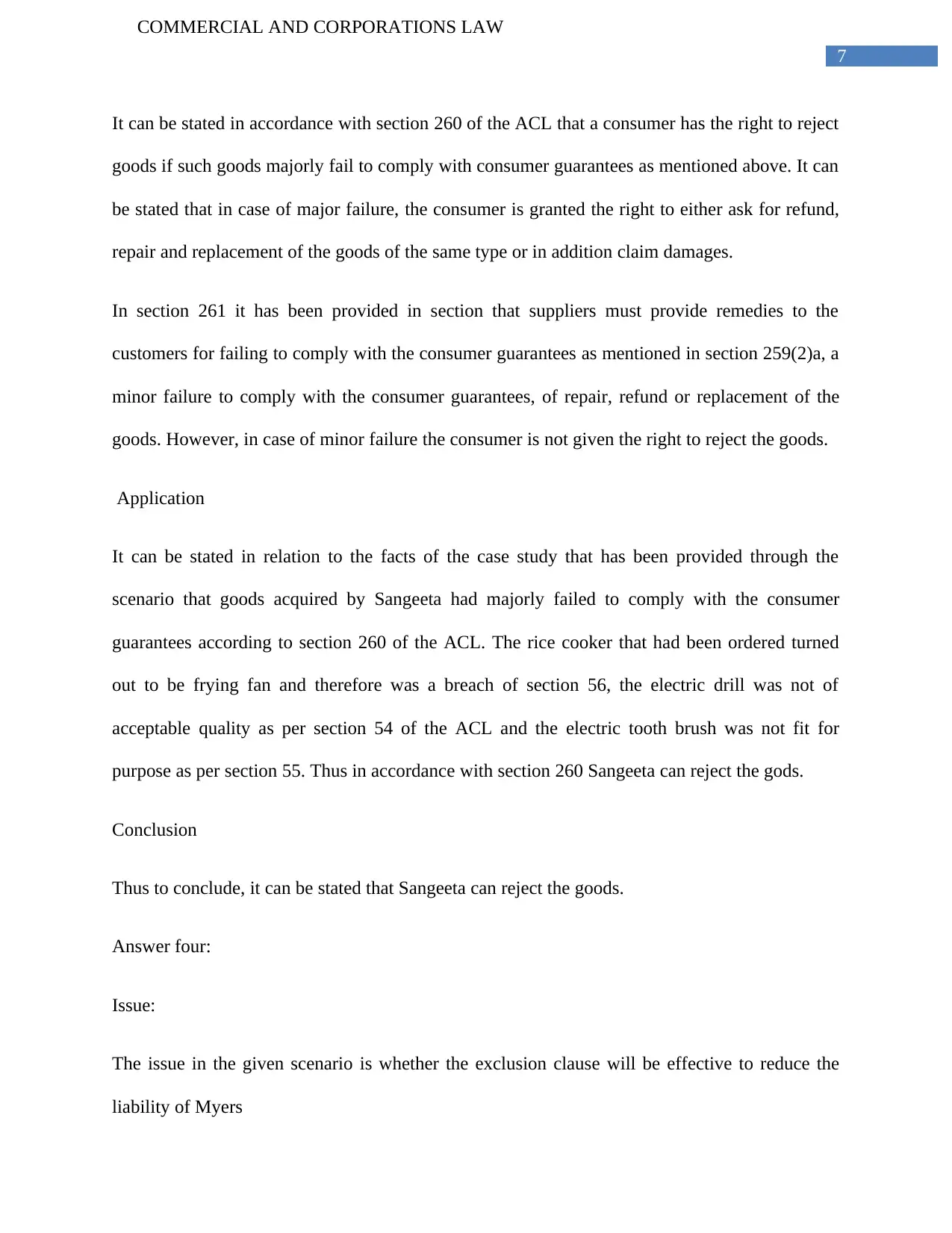
7
COMMERCIAL AND CORPORATIONS LAW
It can be stated in accordance with section 260 of the ACL that a consumer has the right to reject
goods if such goods majorly fail to comply with consumer guarantees as mentioned above. It can
be stated that in case of major failure, the consumer is granted the right to either ask for refund,
repair and replacement of the goods of the same type or in addition claim damages.
In section 261 it has been provided in section that suppliers must provide remedies to the
customers for failing to comply with the consumer guarantees as mentioned in section 259(2)a, a
minor failure to comply with the consumer guarantees, of repair, refund or replacement of the
goods. However, in case of minor failure the consumer is not given the right to reject the goods.
Application
It can be stated in relation to the facts of the case study that has been provided through the
scenario that goods acquired by Sangeeta had majorly failed to comply with the consumer
guarantees according to section 260 of the ACL. The rice cooker that had been ordered turned
out to be frying fan and therefore was a breach of section 56, the electric drill was not of
acceptable quality as per section 54 of the ACL and the electric tooth brush was not fit for
purpose as per section 55. Thus in accordance with section 260 Sangeeta can reject the gods.
Conclusion
Thus to conclude, it can be stated that Sangeeta can reject the goods.
Answer four:
Issue:
The issue in the given scenario is whether the exclusion clause will be effective to reduce the
liability of Myers
COMMERCIAL AND CORPORATIONS LAW
It can be stated in accordance with section 260 of the ACL that a consumer has the right to reject
goods if such goods majorly fail to comply with consumer guarantees as mentioned above. It can
be stated that in case of major failure, the consumer is granted the right to either ask for refund,
repair and replacement of the goods of the same type or in addition claim damages.
In section 261 it has been provided in section that suppliers must provide remedies to the
customers for failing to comply with the consumer guarantees as mentioned in section 259(2)a, a
minor failure to comply with the consumer guarantees, of repair, refund or replacement of the
goods. However, in case of minor failure the consumer is not given the right to reject the goods.
Application
It can be stated in relation to the facts of the case study that has been provided through the
scenario that goods acquired by Sangeeta had majorly failed to comply with the consumer
guarantees according to section 260 of the ACL. The rice cooker that had been ordered turned
out to be frying fan and therefore was a breach of section 56, the electric drill was not of
acceptable quality as per section 54 of the ACL and the electric tooth brush was not fit for
purpose as per section 55. Thus in accordance with section 260 Sangeeta can reject the gods.
Conclusion
Thus to conclude, it can be stated that Sangeeta can reject the goods.
Answer four:
Issue:
The issue in the given scenario is whether the exclusion clause will be effective to reduce the
liability of Myers
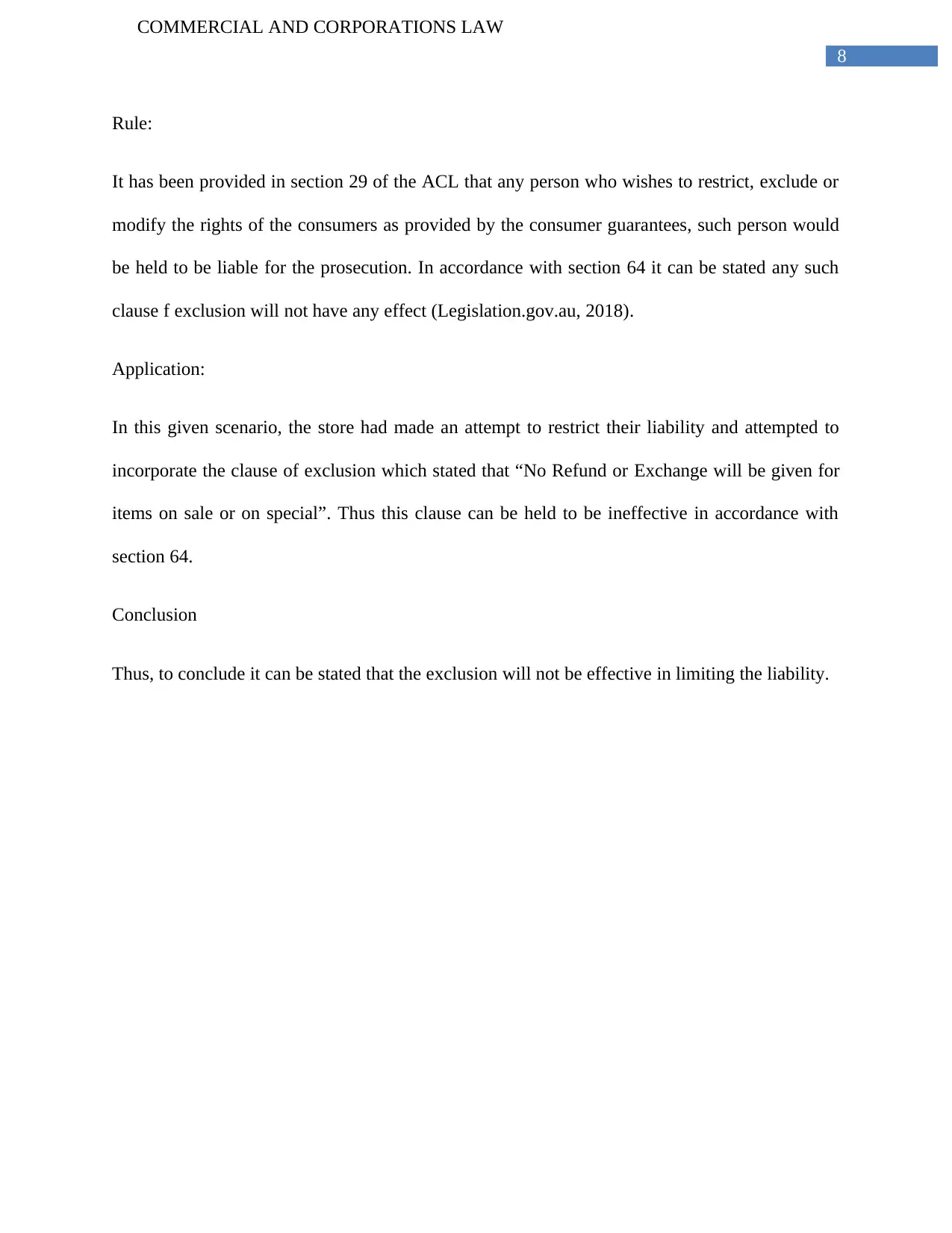
8
COMMERCIAL AND CORPORATIONS LAW
Rule:
It has been provided in section 29 of the ACL that any person who wishes to restrict, exclude or
modify the rights of the consumers as provided by the consumer guarantees, such person would
be held to be liable for the prosecution. In accordance with section 64 it can be stated any such
clause f exclusion will not have any effect (Legislation.gov.au, 2018).
Application:
In this given scenario, the store had made an attempt to restrict their liability and attempted to
incorporate the clause of exclusion which stated that “No Refund or Exchange will be given for
items on sale or on special”. Thus this clause can be held to be ineffective in accordance with
section 64.
Conclusion
Thus, to conclude it can be stated that the exclusion will not be effective in limiting the liability.
COMMERCIAL AND CORPORATIONS LAW
Rule:
It has been provided in section 29 of the ACL that any person who wishes to restrict, exclude or
modify the rights of the consumers as provided by the consumer guarantees, such person would
be held to be liable for the prosecution. In accordance with section 64 it can be stated any such
clause f exclusion will not have any effect (Legislation.gov.au, 2018).
Application:
In this given scenario, the store had made an attempt to restrict their liability and attempted to
incorporate the clause of exclusion which stated that “No Refund or Exchange will be given for
items on sale or on special”. Thus this clause can be held to be ineffective in accordance with
section 64.
Conclusion
Thus, to conclude it can be stated that the exclusion will not be effective in limiting the liability.
⊘ This is a preview!⊘
Do you want full access?
Subscribe today to unlock all pages.

Trusted by 1+ million students worldwide
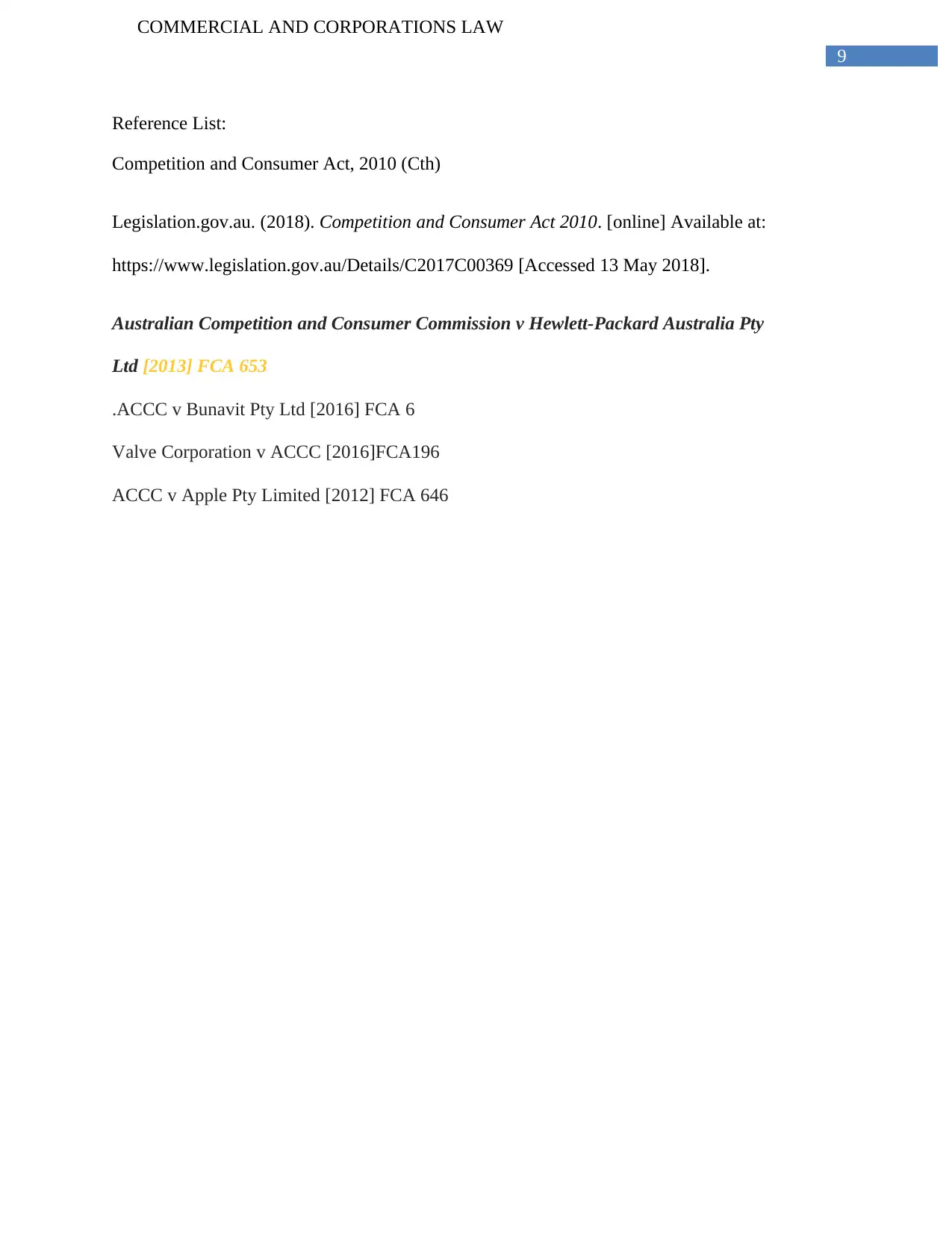
9
COMMERCIAL AND CORPORATIONS LAW
Reference List:
Competition and Consumer Act, 2010 (Cth)
Legislation.gov.au. (2018). Competition and Consumer Act 2010. [online] Available at:
https://www.legislation.gov.au/Details/C2017C00369 [Accessed 13 May 2018].
Australian Competition and Consumer Commission v Hewlett-Packard Australia Pty
Ltd [2013] FCA 653
.ACCC v Bunavit Pty Ltd [2016] FCA 6
Valve Corporation v ACCC [2016]FCA196
ACCC v Apple Pty Limited [2012] FCA 646
COMMERCIAL AND CORPORATIONS LAW
Reference List:
Competition and Consumer Act, 2010 (Cth)
Legislation.gov.au. (2018). Competition and Consumer Act 2010. [online] Available at:
https://www.legislation.gov.au/Details/C2017C00369 [Accessed 13 May 2018].
Australian Competition and Consumer Commission v Hewlett-Packard Australia Pty
Ltd [2013] FCA 653
.ACCC v Bunavit Pty Ltd [2016] FCA 6
Valve Corporation v ACCC [2016]FCA196
ACCC v Apple Pty Limited [2012] FCA 646
1 out of 10
Related Documents
Your All-in-One AI-Powered Toolkit for Academic Success.
+13062052269
info@desklib.com
Available 24*7 on WhatsApp / Email
![[object Object]](/_next/static/media/star-bottom.7253800d.svg)
Unlock your academic potential
Copyright © 2020–2026 A2Z Services. All Rights Reserved. Developed and managed by ZUCOL.





